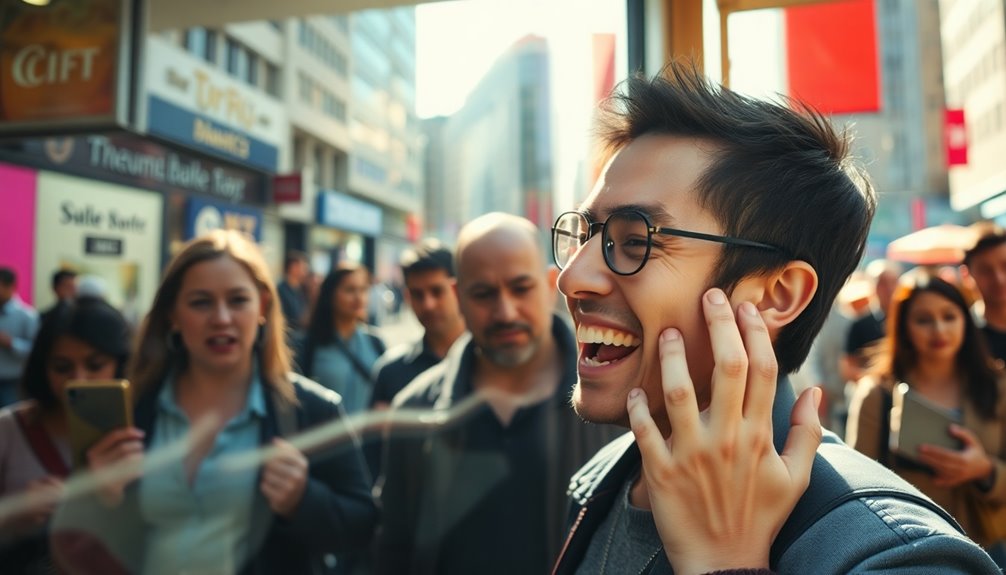Limiting your social media use helps reduce digital overwhelm, making you feel less anxious and stressed. By cutting back, you regain control over your digital life and focus more on real-world experiences. This boosts your mood, improves sleep, and helps you stay present. Slowing down screen time also lessens exposure to negative content and comparison. If you want to discover more ways to boost your well-being through a digital detox, keep exploring these helpful tips.
Key Takeaways
- Limiting social media reduces feelings of overwhelm, anxiety, and mental fatigue, promoting overall mental health.
- A digital detox fosters greater presence and focus on real-life experiences, enhancing well-being.
- Reducing screen time stabilizes mood and improves sleep quality, supporting emotional balance.
- Cutting back on social media minimizes exposure to negative content, comparison, and cyberbullying.
- Establishing digital boundaries encourages healthier habits and a calmer, more relaxing environment.

In today’s hyper-connected world, it’s easy to feel overwhelmed by constant notifications, social media updates, and endless screen time. These digital distractions can take a toll on your mental health, leaving you feeling anxious, stressed, or even exhausted. When you spend hours scrolling through feeds or checking notifications, your mind rarely gets the chance to rest or reset. This ongoing cycle of digital engagement can increase feelings of loneliness, decrease your attention span, and contribute to a sense of burnout. Recognizing the impact of excessive screen time on your mental health is the first step toward creating healthier habits and finding a better balance.
Limiting your social media use isn’t about completely disconnecting from the digital world but rather about regaining control over how you interact with it. When you cut back on screen time, you give yourself space to focus on real-world experiences, which can significantly improve your mental well-being. You might notice that your mood becomes more stable, your sleep improves, and you feel more present during daily activities. Reducing social media exposure also minimizes exposure to negative content, comparison, and cyberbullying, all of which can chip away at your self-esteem and overall happiness. By consciously setting boundaries around your digital consumption, you create room for more meaningful interactions and personal reflection.
Implementing a digital detox can be simple and effective. Start by designating specific times of day when you avoid screens altogether—perhaps during meals, right after waking up, or before bed. Use these moments to engage in activities that nourish your mental health, such as reading, exercising, or practicing mindfulness. Turn off non-essential notifications to prevent constant interruptions that fragment your focus. Consider deleting or temporarily disabling apps that trigger unnecessary scrolling, especially if you find yourself mindlessly reaching for your phone. As you reduce your screen time, pay attention to how your mental health responds. Many people report feeling more relaxed, less anxious, and more connected to the present moment. Additionally, incorporating air purifiers into your living space can help create a healthier environment by reducing indoor pollutants and allergens, further supporting your overall well-being.
Frequently Asked Questions
How Long Should a Digital Detox Last for Optimal Benefits?
A digital detox should last at least a few days to a week for ideal benefits. During this time, cut down on screen time and use activity tracking to monitor your progress. You’ll notice improved focus, reduced stress, and better sleep. A longer detox helps break habits and resets your relationship with social media, making it easier to maintain healthier boundaries afterward. Commit for a week and see the positive changes unfold.
Can Digital Detoxing Improve Mental Health Disorders?
A digital detox can be like clearing fog from your mind, helping your mental health. By reducing screen time, you give your brain space to breathe, which can lessen anxiety and depression symptoms. Although it’s not a cure, limiting social media often improves mental clarity and emotional balance. You’ll find it easier to focus and connect authentically, making digital detoxing a valuable step toward better mental health.
Are There Any Risks Associated With Digital Detoxing?
Yes, there are risks with digital detoxing. You might face privacy concerns if you disconnect from online accounts or social media platforms, potentially exposing sensitive information. Additionally, if you’re dealing with digital addiction, abrupt detoxing can cause withdrawal symptoms like anxiety or irritability. It’s essential to plan your detox carefully, balancing the benefits with these risks, and consider gradual steps to stay safe while improving your well-being.
How Can I Maintain Social Connections During a Detox?
Think of your social connections as a garden that needs tending. During a digital detox, you can nurture it through in-person interactions, which strengthen bonds like sunlight and water. Schedule regular meetups or calls to stay connected. Meanwhile, develop hobbies that encourage shared experiences, creating new roots for your relationships. By actively engaging offline, you keep your social garden thriving, even without the constant buzz of social media.
What Are Effective Alternatives to Social Media During Detox Periods?
You can explore mindful activities like meditation or journaling, which help you stay centered without screens. Offline hobbies such as reading, gardening, or cooking keep you engaged and reduce the urge to check social media. Volunteering or taking walks in nature also boost your well-being. These alternatives allow you to connect with yourself and your surroundings, making your detox more fulfilling and reducing dependency on digital devices.
Conclusion
Imagine waking up tomorrow, your phone untouched, the screen dark. You step outside, feeling the sun on your face, your thoughts clearer than ever. As you disconnect from social media, you start to notice the world around you—colors brighter, conversations richer. But will you resist the urge to check again? Or will this digital detox become your secret escape, revealing a happiness you never knew existed? The choice is yours—what will you discover?











